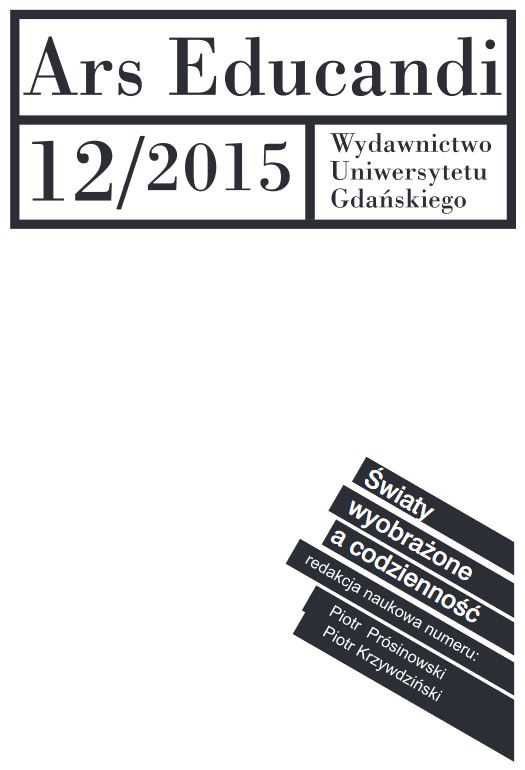Constructs of Sexuality in the Context of Imaginary Worlds
DOI:
https://doi.org/10.26881/ae.2015.12.05Keywords:
sexuality, social constructionism, Internet, social scriptsAbstract
While discussing sexuality we are referring to a multidimensional sphere of elements that construct everyday social life. These elements are influenced by a number of factors, including those derived from imaginary worlds. The sphere of imagery is therefore directly linked to sexuality. Symbols, meanings, stories and desires are all parts of intersubjective imaginary worlds and their negotiations are possible by means of, inter alia, the new media, and the internet in particular. Not only is the latter a key opening the door to the world of countless opportunities of pursuing and negotiating sexuality. Reality can be “fixed”, or even created from scratch. Imaginary worlds, therefore, can be understood in two ways: as intersubjective worlds: patterns and meaning shared at the collective level, as well as the subjective worlds, which are implementation of these patterns and meanings from an intrapsychic level.

English translation: Anna Moroz-Darska
Modernisation of the journal's operations and translation into the English language of articles published in Ars Educandi in 2012-2017 were financed with funds from the Ministry of Science and Higher Education as a part of the task Science Promotion Activity (pl. DUN).
The task ‘The implementation of the editorial module on the platform of Uniwersyteckie Czasopisma Naukowe – a system facilitating the editing and management of the academic journal Ars Educandi‘ was financed as a part of contract 661/P-DUN/2018 of 12.06.2018 from funds of the Ministry of Science and Higher Education designated for the promotion of science.
The task ‘The creation of a modern online version of the academic journal Ars Educandi through the implementation of the publication module on the platform of Uniwersyteckie Czasopisma Naukowe and the handling of international indexing databases’ was financed as a part of contract 661/P-DUN/2018 of 12.06.2018 from funds of the Ministry of Science and Higher Education designated for the promotion of science.
The task ‘Preparation of the English language version of the last 6 annual issues (2012-2017) of the academic journal Ars Educandi and their publication online’ was financed as a part of contract 661/P-DUN/2018 of 12.06.2018 from funds of the Ministry of Science and Higher Education designated for the promotion of science.
Downloads
References
Archard D., 1998, Sexual Consent, London: Westview Press.
Bauman, Z., 1993, Ponowoczesne wzory osobowe, „Studia Socjologiczne” nr 2.
Bem S.L., 2000, Męskość – kobiecość. O różnicach wynikających z płci, tłum. S. Pikiel, Gdańsk: GWP.
Bieńko M., 2004, Seksualność dziecka w aspekcie psychospołecznym [w:] Wykorzystywanie seksualne dzieci. Teoria, badania, praktyka, red. M. Sajkowska, Warszawa: Fundacja „Dzieci Niczyje”.
Burr V., 1995, An Introduction to Social Constructivism, London: Routledge.
Castells M., 2003, Galaktyka Internetu: refleksje nad Internetem, biznesem i społeczeństwem, tłum. T. Hornowski, Poznań: Rebis.
CBOS, 2012, Komunikat z badań. BS/81/2012. Korzystanie z Internetu, http://www.cbos.pl/SPISKOM.POL/2012/K_081_12.PDF [dostęp: 5.12.2014].
Giddens A., 1992, The Transformation of Intimacy: Sexuality, Love and Eroticism in Modern Societies, Stanford California: Stanford University Press.
Giddens A., 2002, Nowoczesność i tożsamość: „Ja” i społeczeństwo w epoce późnej nowoczesności, Warszawa: PWN.
Giddens A., 2004, Socjologia, tłum. A. Szulżycka, Warszawa: PWN.
Giddens A., 2008, Konsekwencje nowoczesności, tłum. E. Klekot, Kraków: Wydawnictwo Uniwersytetu Jagiellońskiego.
Izdebski Z., 2012, Seksualność Polaków na początku XXI wieku. Studium badawcze, Kraków: Wydawnictwo Uniwersytetu Jagiellońskiego.
Izdebski Z., Niemiec T., Wąż K., 2011, (Zbyt) młodzi rodzice. Warszawa: Wydawnictwo TRIO.
Kochanowski J., 2013, Socjologia Seksualności. Marginesy, Warszawa: PWN.
Mathews G., 2005, Supermarket kultury. Kultura globalna a tożsamość jednostki, tłum. E. Klekot, Warszawa: PIW.
Melosik Z., 2012, Mass media, tożsamość i rekonstrukcje kultury współczesnej [w:] Media, edukacja, kultura. W stronę edukacji medialnej, red. W. Skrzydlewski, S. Dylak, Poznań–Rzeszów: Polskie Towarzystwo Technologii i Mediów Edukacyjnych.
Simon W., Gagnon J.H., 1984, Sexual Scripts, „Society” Vol. 22, Iss. 1.
Szlendak T., 2013, Kultura nadmiaru w czasach niedomiaru. Podsumowanie i wnioski z obrad III Elbląskiego Forum Kulturoznawczego, „Kultura Współczesna” nr 1.
Ściupider-Młodkowska M., 2013, Intymność w kulturze flirtu i uwodzenia, „Studia Edukacyjne” nr 29.
Tomanek P., 2012, Ujarzmienie czy legitymizacja? Normalizacyjne aspekty dyskursów eksperckich, „Studia Socjologiczne” nr 1.
Waites M., 2005, The Age of Consent. Young People, Sexuality and Citizenship, New York: Palgrave McMillan.
Weeks J., 1986, Sexuality, London–New York: Routledge.
Weeks J., 2010, Wynalezienie seksualności [w]: Antropologia seksualności. Teoria. Etnografia. Zastosowanie, red. A. Kościańska, tłum. M. Petryk, Warszawa: Wydawnictwa Uniwersytetu Warszawskiego.
Weeks J., Holland J., Waites M. (eds.), 2003, Sexualities and Society: A Reader, Cambridge UK: Polity Press.
WHO, BZgA, 2012, Standardy edukacji seksualnej w Europie. Podstawowe zalecenia dla decydentów oraz specjalistów zajmujących się edukacją i zdrowiem, BZGA WHO Biuro Regionalnego Światowej Organizacji Zdrowia dla Europy i Federalnego Biura ds. Edukacji Zdrowotnej w Kolonii.
Wiederman M.W., 2015, Sexual Script Theory. Past, Present, and Future [w:] J. DeLamater, R.F. Plante (eds.), Handbook of the Sociology of Sexualitiesand Social Research, Springer International Publishing Switzerland.
Zabielska J., 2009, Edukacja seksualna w szkole – wstydliwy problem [w:] Przemiany seksualności, red. M. Kaczorek, K. Stachura, Gdańsk: Wydawnictwo Uniwersytetu Gdańskiego.

 Academic Scientific Journals
Academic Scientific Journals




